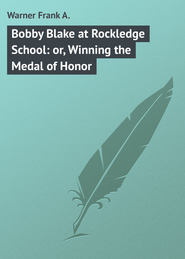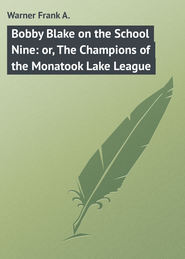По всем вопросам обращайтесь на: info@litportal.ru
(©) 2003-2024.
✖
Bobby Blake on a Plantation: or, Lost in the Great Swamp
Автор
Год написания книги
2017
Настройки чтения
Размер шрифта
Высота строк
Поля
“The ’gators dig out holes in the sand or mud, fill them with eggs, and then cover the whole thing over with more sand,” said Lee. “After a while the heat of the sun hatches out the eggs, and then the mother ’gator takes charge of the little fellows and protects them until they’re big enough to take care of themselves.”
“Well, I feel hungry enough now to eat an alligator egg omelet,” said Bobby. “I think we’d better get started, and maybe we’ll run across one of those cute little nests Lee was telling us about.”
After eating the last of the fish they had caught the day before, the boys started out, intending to follow the river as nearly as possible. But they soon found that the ground kept getting softer at every step they took, and were forced to bear away from the stream, although still keeping as near as possible to the right direction. Lee was more experienced than the other boys in the matter of making progress over this kind of treacherous footing, and he took the lead. On every side dark pools of water oozed up through the quaking ground. Here and there tussocks of grass had formed, and these offered the only footing to be had at all. Even these were very soft and shaky, and it was necessary to leap continually from one to the other in order to avoid sinking in. At rare intervals some larger hillock then, usual would give the boys a chance to rest a few minutes and get their breath, and it was on one of these that they paused at last, panting and tired.
“Gee!” exclaimed Bobby, as he mopped at his streaming face. “A mile of this is worse than ten miles on hard ground.”
“Harder, and a lot more dangerous,” agreed Lee, soberly. “One fall into one of those green pools and you’d be done for. It would suck you down so fast that nothing could save you.”
The heat was growing intense, and, aided by the rank steam that ascended from the rotting vegetation, seemed almost unbearable. But the boys knew that they had to keep on, because if darkness found them before they reached some firmer ground, their fate would be sealed. After nightfall they would be almost certain to fall into one of the green and stagnant pools and be sucked down to a horrible death.
Even as the boys tried to rest and get their breath, they could feel their feet slowly sinking into the muddy grass, and as they lifted their feet pools of water formed in the depressions left by them.
“Guess it’s a case of ‘keep moving,’” said Fred, as one foot sank in to his ankles and he pulled it out with difficulty. “This swamp is the last place in the world I’d pick for a hike if I had my choice.”
“There’s no choice about this,” said Bobby, setting his lips grimly. “We’re here, and we’ve got to get out just as soon as we can. Let’s go!”
Somewhat rested by their brief halt, they started on again. Suddenly Lee, who was ahead, shouted a warning.
“We can’t get any farther this way!” he cried, as Bobby and Fred caught up with him, and he pointed ahead. The boys saw a large stagnant pond, covered with green scum, from which protruded the rotting trunks of trees. At intervals around the bank lay what appeared to be other logs, but even as they looked, one of these seeming logs stirred, and crawling slowly through the ooze, flopped into the water with a loud splash.
“We’re blocked, sure enough,” said Bobby. “We’ll have to go back and try some fresh path.”
“Looks that way,” assented Lee. “And I hope we find some bit of solid ground soon, fellows, because I’m pretty near all in. I can’t go much further.”
For the first time the boys realized the deadly danger in which they stood. The strenuous exertions necessary to keep away from being swallowed up by the black mud, the terrific heat, and the deadly gases that rose continually from the rotting vegetable matter, were all combining to sap their strength. And if that once gave out they realized there was no alternative but death in the clinging, suffocating mud.
Bobby felt his own heart sink, but he showed nothing of this in his manner as he said: “Ah, we’ll be all right in a little while, Lee. We’re bound to hit dry ground pretty soon. Keep a stiff upper lip and we’ll get through right enough.”
“Well, you’d better set the pace, and I’ll do my best to keep up,” returned the Southern boy.
Accordingly, Bobby started off, followed by Lee, with Fred last. Bobby had become somewhat used to picking his way over the grass tussocks by this time, and in addition he seemed to have a sort of instinct which, told him what path to take and which to avoid. Under his guidance they made better progress, and after a time Fred remarked:
“I may be only dreaming, but it seems to me that the ground is getting a little firmer. What do you fellows think?”
“I reckon it is,” panted Lee. “I’ve heard the darkeys say there was an island in the swamp somewhere, and maybe we’re getting near it.”
Sure enough, they soon spied higher ground ahead of them, with some trees growing on it. The sight gave them fresh courage, and they struggled gamely on, until at last came a time when they could put foot to ground without feeling it sink into slimy mud.
CHAPTER XX
THE ALLIGATOR’S JAWS
“Thank Heaven,” gasped Lee, as the three boys threw themselves down and lay panting in the grateful shade of a big tree. “I’m all in. I couldn’t possibly have gone half a mile more.”
“I guess we’re about as bad,” said Fred. “I’m willing to admit that I was never so near the end of my rope. Any one would have thought you knew this island was here, Bobby, from the way you headed for it.”
“It was just a guess,” declared Bobby. “I figured that probably if we got further away from the river the ground might be less swampy and it would pay us to go in that direction even if we were getting farther from home.”
“We wouldn’t have got there very fast the way I was heading you anyway,” said Lee. “Poor mother will be terribly worried about us.”
“Yes,” agreed Bobby soberly, “that’s the trouble; when, we fellows get into trouble of any kind, our mothers suffer more over it than we do.”
In a short time they had recovered a good deal from their strenuous exertions, and now all three found themselves ravenously hungry. But to feel hungry and to satisfy that hunger were two very different things, as they soon discovered. They had read of people marooned on islands in the ocean, but in every such case there had seemed to be a convenient flock of goats or a handy beach strewn with shellfish. But after the boys had thoroughly ransacked their island, they found no such convenient supply. The place was only about a quarter of a mile across, hemmed in on every side with brown water and black mud.
Luckily, however, they had hung onto their fishing rods, and they had no difficulty in digging up a plentiful supply of worms in the rich earth. Fred was the first to get a bite, and he reeled in the fish as fast as he could, being much too eager to see the fish toasting over a fire to make any attempt to “play” him. It was not long before they had four small fish, and these they proceeded to clean and kill without wasting any time over it.
“Scubbity-yow!” exclaimed Fred, as he bit into the delicious morsel, “I never knew a fish could taste so good. These fellows are only samples. We’ll have to get busy and catch about a hundred more before I’ll feel satisfied.”
“If you’ll eat a hundred, I’ll catch them for you,” laughed Bobby.
“And I’ll clean them and cook them for you,” seconded Lee.
“All right, go ahead and start in,” said Fred, but the others were not to be taken in so easily.
“No, you don’t,” laughed Bobby. “You get busy and catch some yourself. I’ll bet you couldn’t eat two more to save your life.”
“Well, I’d have a lot of fun trying, anyway,” said Fred, regretfully. “But if you fellows are too lazy to catch fish for me, I suppose I’ll have to do it myself.”
“Looks a lot that way,” agreed Lee, as he cast his line into the water. “You’d better hurry, too, before Bobby and I have them all out.”
They caught and ate fish until they could eat no more, and then lay down in the shade to rest.
“This might be worse, I suppose,” said Bobby, chewing reflectively on a long blade of grass. “A couple of hours ago it would have seemed like Heaven to us.”
“It isn’t so bad here,” said Lee, “but we can’t stay here forever, and after we leave we’ll be as badly off as we were before.”
“Likely,” admitted Bobby, “but then, on the other hand, it doesn’t seem possible we’ll strike anything worse than we went through this morning, anyway.”
“Oh, cut out worrying about the future,” broke in Fred. “For my part, I’ve had enough to eat – although I’ll admit a steady fish diet is beginning to get tiresome – and I’ve got a soft and shady place to lie where I can hear the little birdies singing. So why worry, say I.”
“Yes,” said Lee, scornfully, “and you can hear the pretty alligators singing, too, if you listen hard. Not to mention the mosquitoes and bull-frogs.”
“Better let him be cheerful while he can, Lee,” said Bobby. “He’ll soon forget how happy he is after we get started again.”
“Well, we’ve got a lot to be thankful for, anyway,” contended Fred. “Suppose we’d all been as fat as Pee Wee, and had to go hopping through this everlasting swamp like – like – ”
“Like turkeys on a hot stove?” suggested Lee.
“That seems to about cover it.” said Fred, with a laugh, “even if it isn’t very complimentary to us. But as I was saying, if we’d all been as fat as Pee Wee, we’d never have got here at all. This swamp was never intended for heavyweights.”
“I don’t think it was ever intended for any kind of human being,” said Lee.
“Oh, I don’t know about that,” said Bobby. “It strikes me that this would be an ideal place to put Ap Plunkit and Ben Tompkins, for instance.”
“Wow!” yelled Fred, delightedly. “You certainly had an idea that time, Bobby. And while we’re at it, why not Sandy Jackson and his friend, Snath? Seems to me they’d fit in pretty well, too.”
“Come to think of it, though,” said Bobby, with a serious air, “don’t you think it would be playing it rather low down on the poor alligators! What have they ever done to us that we should wish that bunch on them?”







